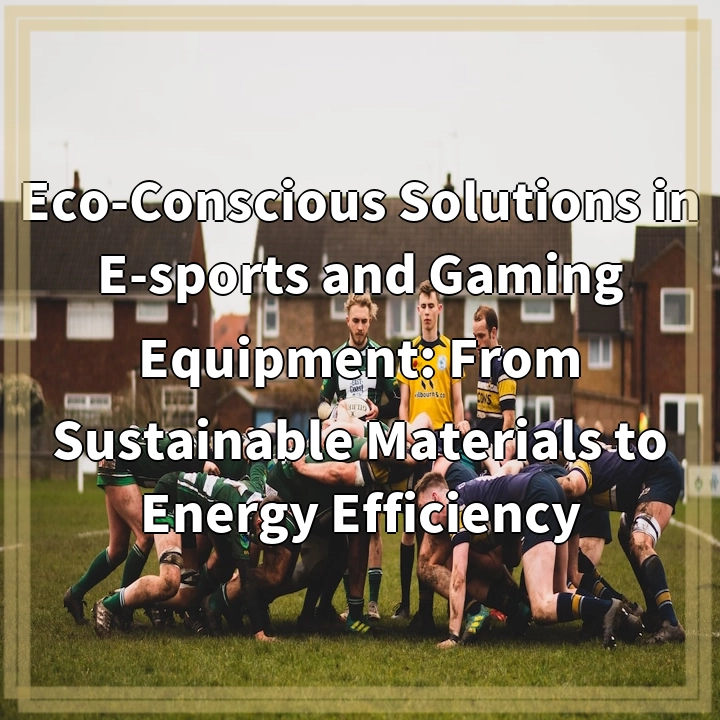
What it is:
Eco-conscious solutions in e-sports and gaming equipment refer to the development and implementation of environmentally friendly practices and technologies within the gaming industry. It involves incorporating sustainability principles into the design, manufacturing, use, and disposal of gaming equipment to minimize the industry’s environmental impact.
Real-World Problems:
Sustainable Materials:
The production of gaming equipment often involves the use of materials that have negative environmental consequences. Plastics, metals, and toxic chemicals are commonly used in the manufacturing process, leading to resource depletion, pollution, and hazardous waste generation. The disposal of these materials after the end of the gaming equipment’s life cycle is also problematic, as they often end up in landfills, contributing to further environmental damage.
Energy Consumption:
Gaming equipment, such as consoles, gaming PCs, and gaming accessories, require significant amounts of energy to operate. This energy consumption contributes to greenhouse gas emissions and puts strain on energy resources, especially when gaming equipment is left on standby or idle for long periods. The high energy demands of e-sports events and gaming competitions also exacerbate their environmental impact.
E-Waste:
With the rapid advancement of technology, gaming equipment is often replaced or upgraded frequently, resulting in a vast amount of electronic waste, or e-waste. Improper disposal of e-waste can have severe consequences for the environment and human health due to the presence of hazardous materials. E-waste management and recycling initiatives are vital to reduce the environmental impact of gaming equipment.
Carbon Footprint:
Gaming events, tournaments, and online gaming contribute to the industry’s carbon footprint through transportation, infrastructure, and the energy required to power servers and gaming facilities. The growing popularity of e-sports worldwide has resulted in increased travel, both for players and spectators, further exacerbating carbon emissions.
Cultural Shift and Education:
One of the challenges in implementing eco-conscious solutions in the gaming industry is the need for a cultural shift and education among gamers, enthusiasts, and manufacturers. Raising awareness about the environmental impact of gaming equipment and promoting sustainable alternatives can help drive the adoption of eco-friendly practices.

Solutions:
1. Sustainable Materials:
Manufacturers can explore and use sustainable materials in the production of gaming equipment. This includes materials with a lower environmental impact, such as recycled plastics, bioplastics, and responsibly sourced metals. Additionally, reducing the use of toxic chemicals and incorporating eco-friendly manufacturing processes can minimize the negative environmental effects.
2. Energy Efficiency:
Improving the energy efficiency of gaming equipment can greatly reduce its carbon footprint. Manufacturers can design devices that consume less energy during operation and enhance power-saving modes. Gamers can also adopt energy-efficient habits, such as turning off equipment when not in use and optimizing settings to reduce energy consumption during gameplay.
3. E-Waste Management:
Encouraging proper e-waste management and recycling is crucial to mitigate the negative impacts of discarded gaming equipment. Manufacturers can take responsibility by establishing take-back programs and implementing recycling initiatives. Consumers should be educated about the importance of recycling and disposing of gaming equipment at designated recycling centers or through electronics recycling events.
4. Carbon Offsetting and Renewable Energy:
Gaming organizations and event planners can offset the carbon emissions associated with gaming events and competitions by investing in carbon offset projects. This can include initiatives such as tree planting, supporting renewable energy projects, or funding environmental conservation programs. Additionally, transitioning to renewable energy sources for powering gaming facilities can significantly reduce the industry’s carbon footprint.
5. Education and Awareness:
Creating educational resources and campaigns to increase awareness about the environmental impact of gaming equipment is essential. Promoting eco-conscious gaming practices, encouraging responsible purchasing decisions, and advocating for sustainable alternatives can help drive a cultural shift towards more environmentally friendly gaming habits.















